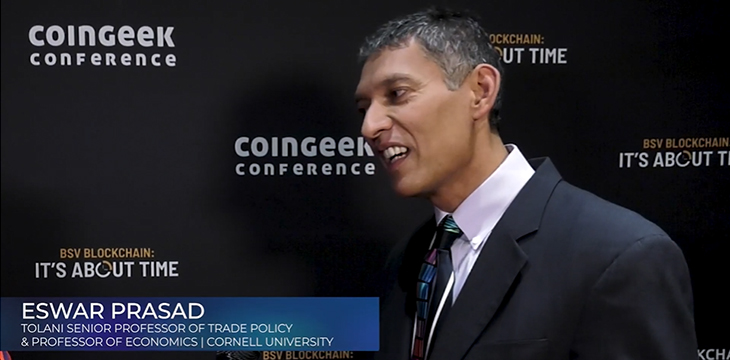|
Getting your Trinity Audio player ready...
|
Tolani Senior Professor of Trade Policy and Professor of Economics at Cornell University, Eswar Prasad, joined the panel on “Bitcoin & Blockchain – Can Real Value Come from Utility” during the third day of the CoinGeek New York Conference.
The professor, who is a renowned economist and the author of the book “The Future of Money,” caught up with CoinGeek Backstage reporter Nidhi Arora to talk about his experience attending the conference, his opinions regarding central bank digital currencies (CBDC), and much more.
“It’s been very exciting to see the amount of excitement there is around Bitcoin and blockchain technologies. I usually hang out in the world of academics and central bankers, and there are concerns about Bitcoin and the underlying technology. There is a lot of conservative views about how fast these technologies might move. The risks that they might entail, but here I hear a lot more about the opportunities, the possibilities. So, it is quite invigorating,” Prasad said on his conference experience.
Prasad has been in the financial world for quite some time now, and he has published a book about it. With the “Future of Money,” he tackled the acceleration of the financial change from the end of cash to the popularity of digital currencies.
“As I point out in the book, I’m a little skeptical about whether Bitcoin will survive as a store of value, as a real financial asset, but I think the underlying technology is very powerful and indeed transformational,” Prasad noted.
“This new technology is providing ways to democratize finance, making basic banking products, and services digital payments available even to low-income households—those who are economically disenfranchised. So, I think that can have a very powerful effect. Whatever happens with Bitcoin, the technology is going to have a real legacy,” he added.
One of the most heated topics today is how digital currencies emerge worldwide. Several countries are developing their own CBDC, like China and Nigeria. For Prasad, one of the fundamental issues that he sees with this development is how Bitcoin has become more of a speculative financial asset rather than serving as a trustless medium of exchange which it was initially meant to be.
He explained, “I ask myself when I consider any asset is whether it serves an intrinsic purpose. Bitcoin (BTC), in its initial formulation, was meant to serve as the trustless medium of exchange. It now seems to have become more of a speculative financial asset, but other assets are developing in the crypto world that have more intrinsic value. I think that’s the fundamental issue. There are crypto assets that are coming up that have a value to them, but ultimately, it’s going to depend on how much faith people have in the underlying technology and, of course, the transparency of the technology.”
What are the roles of the university in spreading awareness about digital currency and blockchain technology? As Prasad pointed out, academics can play a crucial role in the dialogue between the Bitcoin world and governments.
“Right now, there is a big regulatory pushback from Washington but also from many other national governments because they’re concerned about cryptocurrencies, but I think there needs to be more of a dialogue between the crypto world and governments and regulators and perhaps the academics can play a role here,” he said.
In closing, Prasad admitted that he has been doubtful of the nature of the digital currency before, yet he believes in the technology’s transformational value. However, he also acknowledges that risks will not be solved by depending on the technology alone and stated that getting the governments involved could help the Bitcoin community achieve stability.
“Despite whatever skepticism you might have heard from me about the nature of the asset itself, I think this technology is really going to have transformation value. It’s going to bring a lot of benefits to the world in terms of making basic banking products and services digital payments widely accessible. But I think it’s important for the crypto community to keep in mind that there are risks that cannot be solved just through technology. Getting governments involved might actually help this entire community by providing more legitimacy but also some regulation that may actually provide more stability to the community. I think working together with the government may be a better idea than trying to resist regulation altogether,” Prasad said.
To learn more about central bank digital currencies and some of the design decisions that need to be considered when creating and launching it, read nChain’s CBDC playbook.
Watch: CoinGeek New York panel, Bitcoin & Blockchain – Can Real Value Come from Utility

 02-17-2026
02-17-2026 




